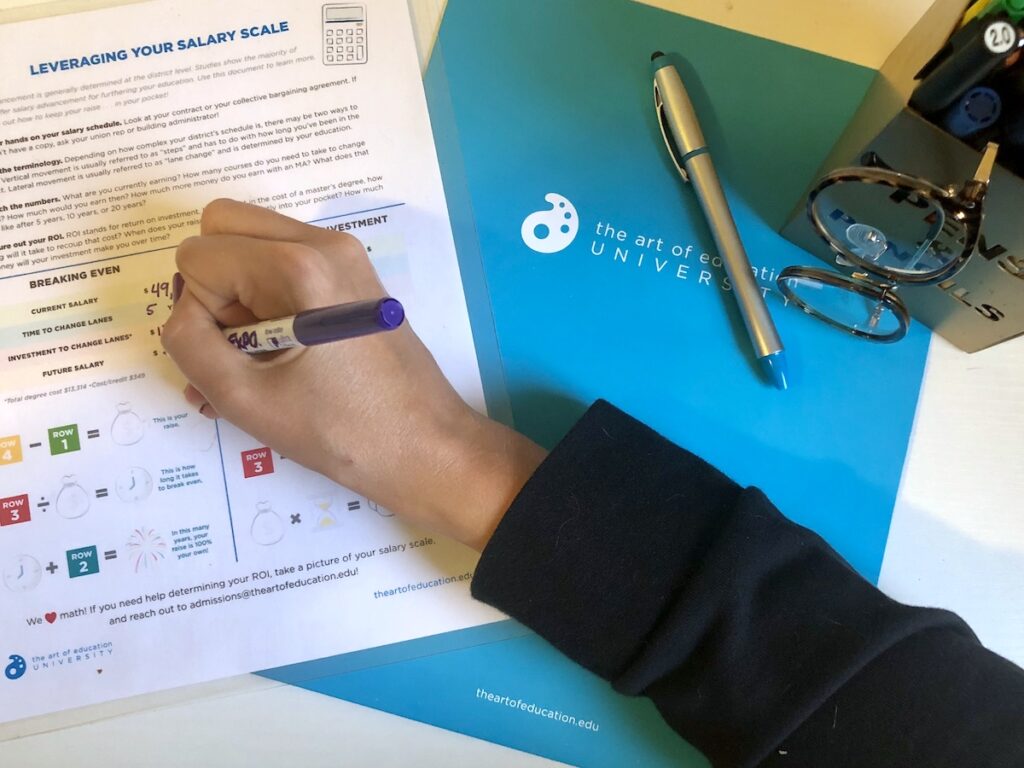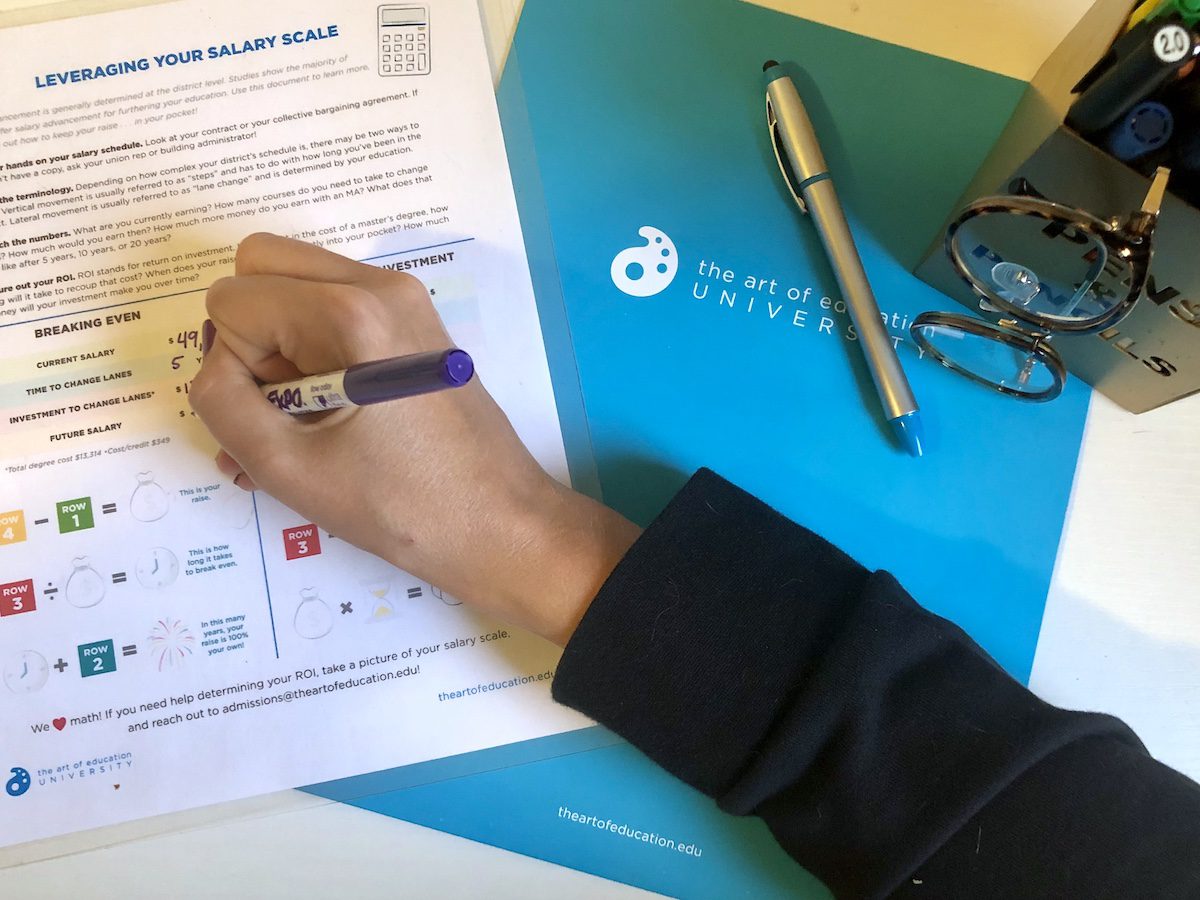Art educators work hard. Imagine a list of everything you do in one single teaching day. It is almost impossible! We are constantly on the move. We plan, advocate, learn, connect, and help our students. This is wonderful, and you should do some of that for yourself! You can set goals for your classroom and, simultaneously, your career.
One way to grow in your career and your salary is to earn a master’s degree. But why?
Students start out with all sorts of reasons to pursue a higher degree: to be a better teacher, to prove to yourself and family that they can do it, and to gain recognition and esteem from administration and colleagues. More often than not, the biggest motivator for students is salary advancement. Art teachers love their work, but they want to and deserve to earn more. In fact, the majority of degree-seeking students at AOEU said their primary motivation for pursuing a master’s degree is to move up the salary scale. So, if you’re looking to earn more, you are in good company!

It can be a difficult choice to invest in yourself and your education. Where will you find the time? How can you make room in your budget? Is it really worth the financial investment? Truthfully, you won’t know until you sit down and crunch some numbers.
Here are the 3 easy steps to leveraging your salary advancement.
1. Get a copy of your salary schedule.
Look over your teaching contract or your district’s collective bargaining agreement. If you don’t have a copy, ask your union representative or a building administrator. Your human resources office will also have a copy.
Begin by looking over the whole schedule to understand what teachers are making at different points in their careers. If you want to compare your school’s salary scale to other schools, do a quick Google search. There are lots of examples online.
2. Learn the terminology your district uses.
Salary advancement is determined at the district level, and every salary schedule is different. Depending on how complex your district’s schedule is, there may be two ways to move: vertical and horizontal.
- Vertical movement usually refers to how much experience you have. It’s sometimes referred to as “steps” or “years of service.” The number of steps depends on the district – anywhere from 7 steps to 36 steps is common. In some schedules, a teacher might stay on the same step for several years. For example, teachers earn the same salary on steps 3 and 4. The final step is where you max out and cannot move up on the salary scale.
- Horizontal movement typically has to do with your education and degrees. Again, every district is different! But this is where it starts to get fun. Look at the different columns. They might say BA, BA+12, BA+24, MA, Ph.D. Typically, the letters refer to the degree (bachelor’s, master’s, doctorate), and the numbers are additional graduate credits. Does your school pay more for a BA+12, more still for a BA+24, and another raise when you complete your master’s degree? As you make lateral jumps, it can help offset the cost of your coursework.
3. Crunch some numbers!
Everybody loves math! No? It’s ok – these calculations aren’t too hard. Sit down with your salary scale and a calculator.
Return on Investment Calculator
Step 1: Figure out when you’ll break even.
Breaking even is all about getting to net 0. When you invest in anything, you want it to pay for itself. Some things pay for themselves in convenience (like a new car) or satisfaction (like a weekend getaway). But really good investments pay for themselves in actual money.
In the “Breaking Even” calculator, we’ll look at the investment to change lanes (lateral movement), determine what you currently earn, how long it will take you to earn the credits to change lanes, the investment in the lane change, and your future salary.
Step 2: Determine the return on your investment.
This is the step where you know your worth! An investment in a master’s degree is significant. However, the dividends it pays for future years might make it your best investment yet. Similar to what we hope happens when we invest in a home, it should accrue value.
In the “Return on Your Investment” calculator, we’ll look at how much money this degree will be earning you. Determine what you currently earn and how much longer you’ll be teaching. A little bit of multiplication, and you’ll see the return on your investment.
The ROI calculator doesn’t take into account your subsequent steps, thus your ROI is likely even more than the number you’ve calculated!
Also, many schools offer a pension. Your pension is usually determined by your salary during your last year or years of teaching. Lane change is the best way to increase your earnings after retirement, too!
While most schools offer salary advancement, others don’t. Should you still pursue a master’s degree or continue your education?
Learn more
- How to Create the Best AOEU Application Possible
- How to Fund Your Master’s Degree Program
- An Inside Look at What It’s Like to be an AOEU Student
Download
Here are a few more things to consider:
- Salary scales change. Contracts are revised every so often, and if your school has a union, the salary schedule is usually a part of the contract negotiations. If you are unhappy with your school’s salary schedule, consider joining the union or sitting on the negotiations team.
- Every district is different. Are you planning to stay in your district until retirement? Are you looking for work elsewhere? If earning more money is important to you, look for other districts that have more incentives! You can find contracts and salary schedules online.
- More benefits. Depending on your goals, you may be able to use graduate credits or a master’s degree to renew your license, upgrade your license, or satisfy professional development requirements. It will definitely help you become a better educator! No matter your goals, we always encourage teachers to check the state map and get district-level approval.
If you’re thinking about earning your master’s degree or need some help understanding how you can leverage your salary schedule, connect with our admissions team. We love math, and we want to help you!
Magazine articles and podcasts are opinions of professional education contributors and do not necessarily represent the position of the Art of Education University (AOEU) or its academic offerings. Contributors use terms in the way they are most often talked about in the scope of their educational experiences.





